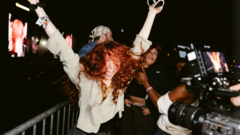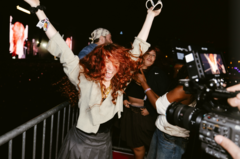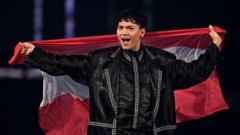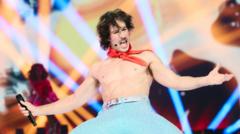This article explores the meticulous planning, teamwork, and challenges that the stage crew encounters to deliver flawless performances during the Eurovision Song Contest.
**Behind the Scenes of the Eurovision Stage Crew: The Timekeepers of Performance**

**Behind the Scenes of the Eurovision Stage Crew: The Timekeepers of Performance**
The invisible crew behind Eurovision faces a critical 35-second window to execute seamless set changes.
Throughout the Eurovision Song Contest, the spotlight shines brightly on the performers, but behind the scenes exists an unseen team, sometimes referred to as the "invisible crew." They have a mere 35 seconds to execute a complete set change, a high-pressure task that includes switching out performers, managing props, and ensuring technical setups, like microphones, are flawlessly in place.
Richard van Rouwendaal, a stage manager from the Netherlands, describes the urgency of these transitions, likening it to a Formula 1 tire change—efficient and swift. "Each person in the crew can only do one thing," he explains, emphasizing the precision required to avoid collisions on stage. "You always walk on the same line."
Weeks prior to the main event, the crew convenes for rehearsals, incorporating stand-ins and local talent to practice the intricate choreography of backstage operations. Van Rouwendaal leads a diverse team of Dutch and local crew members, carefully assigning roles based on individual strengths. "It is a bit like being good at Tetris," he notes, as they strategize to maximize space and efficiency.
Every detail matters: the stage crew even includes cleaners who sweep up between acts to maintain a pristine performance space. "If there’s an overhead shot of someone lying down, you don’t want to see shoeprints on the floor," he adds, underscoring the thoroughness of their preparations.
The grand spectacle of Eurovision involves elaborate staging, with props becoming a central element of performances. From disco balls to large structures, props are meticulously coordinated to appear and disappear from the stage at the right moments. Damaris Reist, the deputy head of production, elaborates on the logistical efforts, noting that props enter and exit in a carefully choreographed manner.
In live performance scenarios, quick thinking is essential. Should anything go awry—a broken camera, a fallen prop—Van Rouwendaal's team is trained to adapt swiftly. They have contingencies, like showcasing audience shots to fill time, until they can resolve the issue.
Organizing a live broadcast of such magnitude requires immense dedication. Reist has worked countless weekends leading up to the event, while Van Rouwendaal recalls the demanding hours logged by his team. In 2008, a previous production legend resorted to building a bunker for team breaks, a testament to long-lasting intensity in the industry.
Despite the high-stress environment, the crew prioritizes camaraderie. Van Rouwendaal shares that creating a fun atmosphere is essential. Recently, he hosted a pancake celebration for his team, reminding everyone that a collective spirit is crucial in forwarding the collaborative objective of making the show a success.
Ultimately, while the performers dazzle viewers on stage, it is the invisible crew that ensures everything runs smoothly, often without an audience ever realizing the precise choreography needed for excellence. If everything aligns as planned, audiences watching the televised broadcast won’t see the crew at all—not a single shoe print or backstage shuffle, just the magic of Eurovision.
Richard van Rouwendaal, a stage manager from the Netherlands, describes the urgency of these transitions, likening it to a Formula 1 tire change—efficient and swift. "Each person in the crew can only do one thing," he explains, emphasizing the precision required to avoid collisions on stage. "You always walk on the same line."
Weeks prior to the main event, the crew convenes for rehearsals, incorporating stand-ins and local talent to practice the intricate choreography of backstage operations. Van Rouwendaal leads a diverse team of Dutch and local crew members, carefully assigning roles based on individual strengths. "It is a bit like being good at Tetris," he notes, as they strategize to maximize space and efficiency.
Every detail matters: the stage crew even includes cleaners who sweep up between acts to maintain a pristine performance space. "If there’s an overhead shot of someone lying down, you don’t want to see shoeprints on the floor," he adds, underscoring the thoroughness of their preparations.
The grand spectacle of Eurovision involves elaborate staging, with props becoming a central element of performances. From disco balls to large structures, props are meticulously coordinated to appear and disappear from the stage at the right moments. Damaris Reist, the deputy head of production, elaborates on the logistical efforts, noting that props enter and exit in a carefully choreographed manner.
In live performance scenarios, quick thinking is essential. Should anything go awry—a broken camera, a fallen prop—Van Rouwendaal's team is trained to adapt swiftly. They have contingencies, like showcasing audience shots to fill time, until they can resolve the issue.
Organizing a live broadcast of such magnitude requires immense dedication. Reist has worked countless weekends leading up to the event, while Van Rouwendaal recalls the demanding hours logged by his team. In 2008, a previous production legend resorted to building a bunker for team breaks, a testament to long-lasting intensity in the industry.
Despite the high-stress environment, the crew prioritizes camaraderie. Van Rouwendaal shares that creating a fun atmosphere is essential. Recently, he hosted a pancake celebration for his team, reminding everyone that a collective spirit is crucial in forwarding the collaborative objective of making the show a success.
Ultimately, while the performers dazzle viewers on stage, it is the invisible crew that ensures everything runs smoothly, often without an audience ever realizing the precise choreography needed for excellence. If everything aligns as planned, audiences watching the televised broadcast won’t see the crew at all—not a single shoe print or backstage shuffle, just the magic of Eurovision.





















